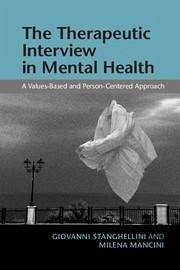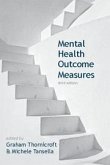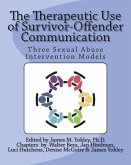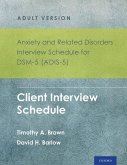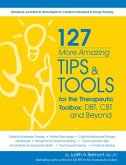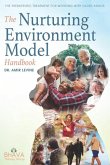Giovanni Stanghellini, Milena Mancini
The Therapeutic Interview in Mental Health
A Values-Based and Person-Centered Approach
Giovanni Stanghellini, Milena Mancini
The Therapeutic Interview in Mental Health
A Values-Based and Person-Centered Approach
- Broschiertes Buch
- Merkliste
- Auf die Merkliste
- Bewerten Bewerten
- Teilen
- Produkt teilen
- Produkterinnerung
- Produkterinnerung
The therapeutic interview approach looks at patients' experiences, emotions and values as the keys to understanding their suffering.
Andere Kunden interessierten sich auch für
![Mental Health Outcome Measures Mental Health Outcome Measures]() Mental Health Outcome Measures53,99 €
Mental Health Outcome Measures53,99 €![The Musical Edge of Therapeutic Dialogue The Musical Edge of Therapeutic Dialogue]() Steven H. KnoblauchThe Musical Edge of Therapeutic Dialogue82,99 €
Steven H. KnoblauchThe Musical Edge of Therapeutic Dialogue82,99 €![The Therapeutic Use of Survivor-Offender Communication: Three Sexual Abuse Intervention Models The Therapeutic Use of Survivor-Offender Communication: Three Sexual Abuse Intervention Models]() The Therapeutic Use of Survivor-Offender Communication: Three Sexual Abuse Intervention Models17,99 €
The Therapeutic Use of Survivor-Offender Communication: Three Sexual Abuse Intervention Models17,99 €![Anxiety and Related Disorders Interview Schedule for Dsm-5 (Adis-5)(R) - Adult Version Anxiety and Related Disorders Interview Schedule for Dsm-5 (Adis-5)(R) - Adult Version]() Timothy A BrownAnxiety and Related Disorders Interview Schedule for Dsm-5 (Adis-5)(R) - Adult Version132,99 €
Timothy A BrownAnxiety and Related Disorders Interview Schedule for Dsm-5 (Adis-5)(R) - Adult Version132,99 €![127 More Amazing Tips and Tools for the Therapeutic Toolbox: Dbt, CBT and Beyond: Handouts, Activities & Worksheets for Creative Individual & Group Th 127 More Amazing Tips and Tools for the Therapeutic Toolbox: Dbt, CBT and Beyond: Handouts, Activities & Worksheets for Creative Individual & Group Th]() Judith Belmont127 More Amazing Tips and Tools for the Therapeutic Toolbox: Dbt, CBT and Beyond: Handouts, Activities & Worksheets for Creative Individual & Group Th27,99 €
Judith Belmont127 More Amazing Tips and Tools for the Therapeutic Toolbox: Dbt, CBT and Beyond: Handouts, Activities & Worksheets for Creative Individual & Group Th27,99 €![The Nurturing Environment Model Handbook: The Therapeutic Treatment For Working With Older Adults The Nurturing Environment Model Handbook: The Therapeutic Treatment For Working With Older Adults]() Amir LevineThe Nurturing Environment Model Handbook: The Therapeutic Treatment For Working With Older Adults22,99 €
Amir LevineThe Nurturing Environment Model Handbook: The Therapeutic Treatment For Working With Older Adults22,99 €![Structuring the Therapeutic Process Structuring the Therapeutic Process]() Murray CoxStructuring the Therapeutic Process43,99 €
Murray CoxStructuring the Therapeutic Process43,99 €-
-
-
The therapeutic interview approach looks at patients' experiences, emotions and values as the keys to understanding their suffering.
Hinweis: Dieser Artikel kann nur an eine deutsche Lieferadresse ausgeliefert werden.
Hinweis: Dieser Artikel kann nur an eine deutsche Lieferadresse ausgeliefert werden.
Produktdetails
- Produktdetails
- Verlag: Cambridge University Press
- Seitenzahl: 186
- Erscheinungstermin: 18. August 2017
- Englisch
- Abmessung: 238mm x 167mm x 12mm
- Gewicht: 345g
- ISBN-13: 9781107499089
- ISBN-10: 1107499089
- Artikelnr.: 48066608
- Herstellerkennzeichnung
- Produktsicherheitsverantwortliche/r
- Europaallee 1
- 36244 Bad Hersfeld
- gpsr@libri.de
- Verlag: Cambridge University Press
- Seitenzahl: 186
- Erscheinungstermin: 18. August 2017
- Englisch
- Abmessung: 238mm x 167mm x 12mm
- Gewicht: 345g
- ISBN-13: 9781107499089
- ISBN-10: 1107499089
- Artikelnr.: 48066608
- Herstellerkennzeichnung
- Produktsicherheitsverantwortliche/r
- Europaallee 1
- 36244 Bad Hersfeld
- gpsr@libri.de
Giovanni Stanghellini, M.D. is Dr. Phil. Honoris Causa, Psychiatrist and Full Professor of Dynamic Psychology and Psychopathology at the Università degli Studi 'G. d'Annunzio' Chieti-Pescara, Italy and Profesor Adjuncto at the Universidad Diego Portales, Chile. He has written extensively on the philosophical foundations of psychopathology, especially from a phenomenological and anthropological viewpoint. He is co-editor of the Oxford University Press series International Perspectives in Philosophy and Psychiatry. He chairs the World Psychiatric Association (WPA) Section on the Humanities, the Association of European Psychiatrists (EPA) Section on Philosophy and Psychiatry, the Scuola di Psicoterapia Fenomenologico-Dinamica, Florence and co-chairs the International Network for Philosophy and Psychiatry. Among his books: Nature and Narrative (co-edited, 2003), Disembodied Spirits and Deanimated Bodies: The Psychopathology of Common Sense (2004), Emotions and Personhood (with R. Rosfort, 2013), One Century of Karl Jaspers' General Psychopathology (co-edited, 2013), Oxford Handbook of Philosophy and Psychiatry (co-edited, 2013) and Lost in Dialogue: Anthropology, Psychopathology and Care (2016).
Part I. The Toolbox: 1. Introduction
2. The technical approach to interviewing
3. Main criticisms of the technical approach
4. The meaning of symptoms in the biomedical paradigm
5. The meaning of symptoms in the psychodynamic paradigm
6. The symptom as a text
7. The concept of 'life-world'
8. An example of life-world analysis
9. What are emotions and why are they relevant to the therapeutic interview?
10. What are values and why are they relevant to the therapeutic interview?
11. A quest for meaning
12. A decalogue for the therapeutic interview
Part II. Life-Worlds: 13. Introduction
14. The life-world of borderline persons
15. The life-world of persons with schizophrenia
16. The life-world of persons with melancholia
17. The life-world of persons with feeding and eating disorders.
2. The technical approach to interviewing
3. Main criticisms of the technical approach
4. The meaning of symptoms in the biomedical paradigm
5. The meaning of symptoms in the psychodynamic paradigm
6. The symptom as a text
7. The concept of 'life-world'
8. An example of life-world analysis
9. What are emotions and why are they relevant to the therapeutic interview?
10. What are values and why are they relevant to the therapeutic interview?
11. A quest for meaning
12. A decalogue for the therapeutic interview
Part II. Life-Worlds: 13. Introduction
14. The life-world of borderline persons
15. The life-world of persons with schizophrenia
16. The life-world of persons with melancholia
17. The life-world of persons with feeding and eating disorders.
Part I. The Toolbox: 1. Introduction
2. The technical approach to interviewing
3. Main criticisms of the technical approach
4. The meaning of symptoms in the biomedical paradigm
5. The meaning of symptoms in the psychodynamic paradigm
6. The symptom as a text
7. The concept of 'life-world'
8. An example of life-world analysis
9. What are emotions and why are they relevant to the therapeutic interview?
10. What are values and why are they relevant to the therapeutic interview?
11. A quest for meaning
12. A decalogue for the therapeutic interview
Part II. Life-Worlds: 13. Introduction
14. The life-world of borderline persons
15. The life-world of persons with schizophrenia
16. The life-world of persons with melancholia
17. The life-world of persons with feeding and eating disorders.
2. The technical approach to interviewing
3. Main criticisms of the technical approach
4. The meaning of symptoms in the biomedical paradigm
5. The meaning of symptoms in the psychodynamic paradigm
6. The symptom as a text
7. The concept of 'life-world'
8. An example of life-world analysis
9. What are emotions and why are they relevant to the therapeutic interview?
10. What are values and why are they relevant to the therapeutic interview?
11. A quest for meaning
12. A decalogue for the therapeutic interview
Part II. Life-Worlds: 13. Introduction
14. The life-world of borderline persons
15. The life-world of persons with schizophrenia
16. The life-world of persons with melancholia
17. The life-world of persons with feeding and eating disorders.

